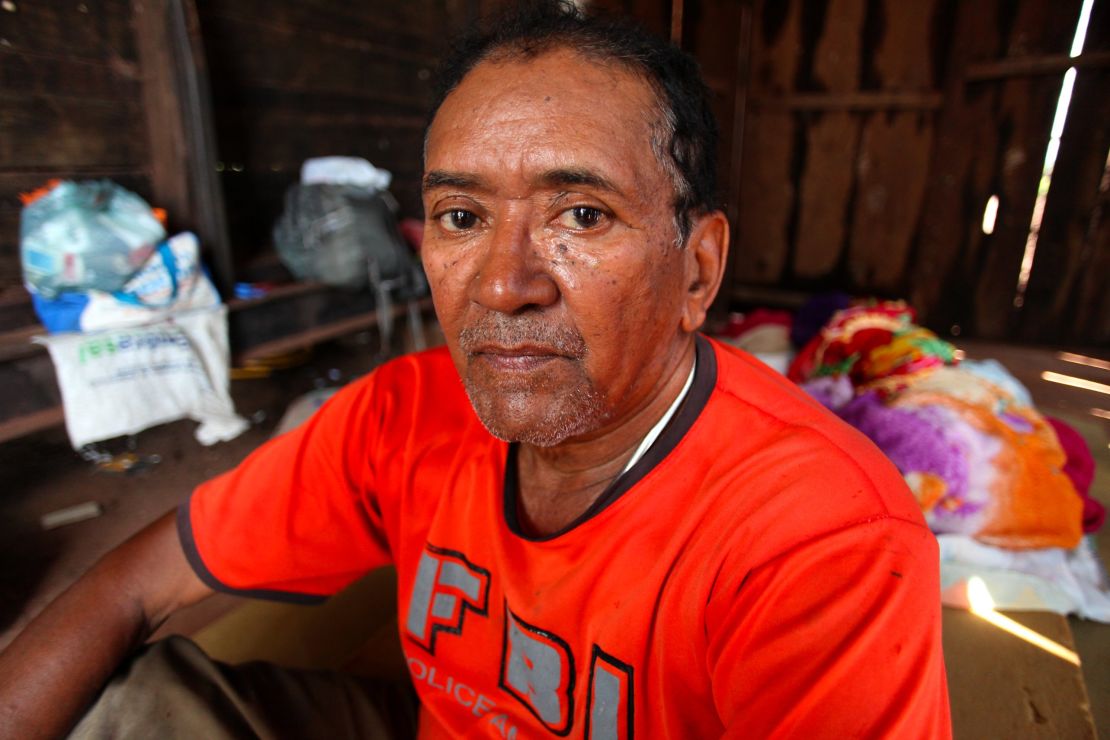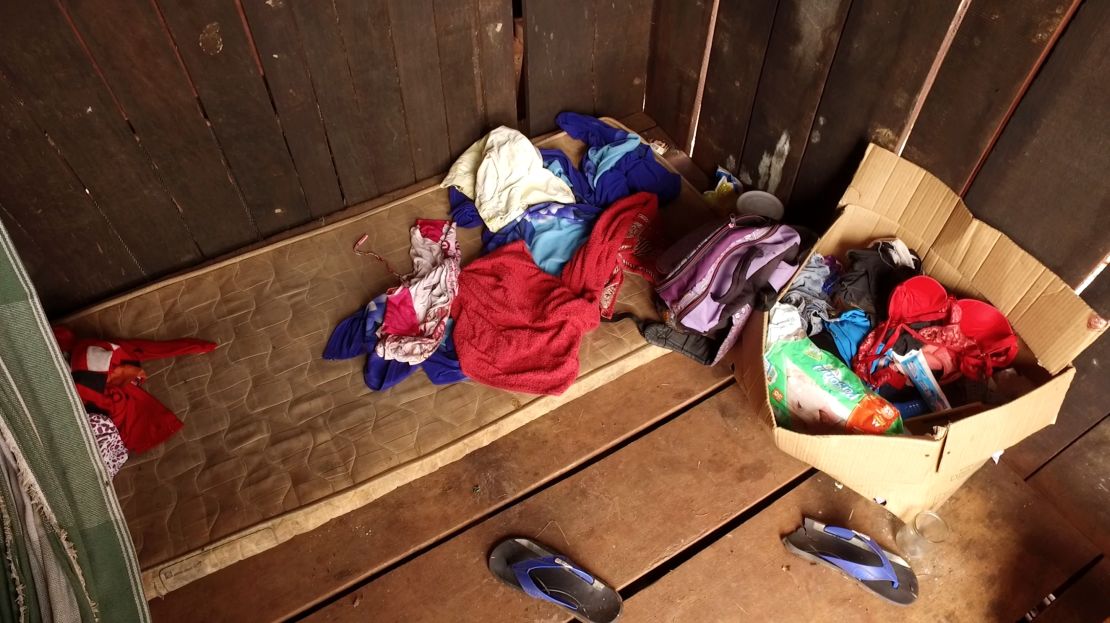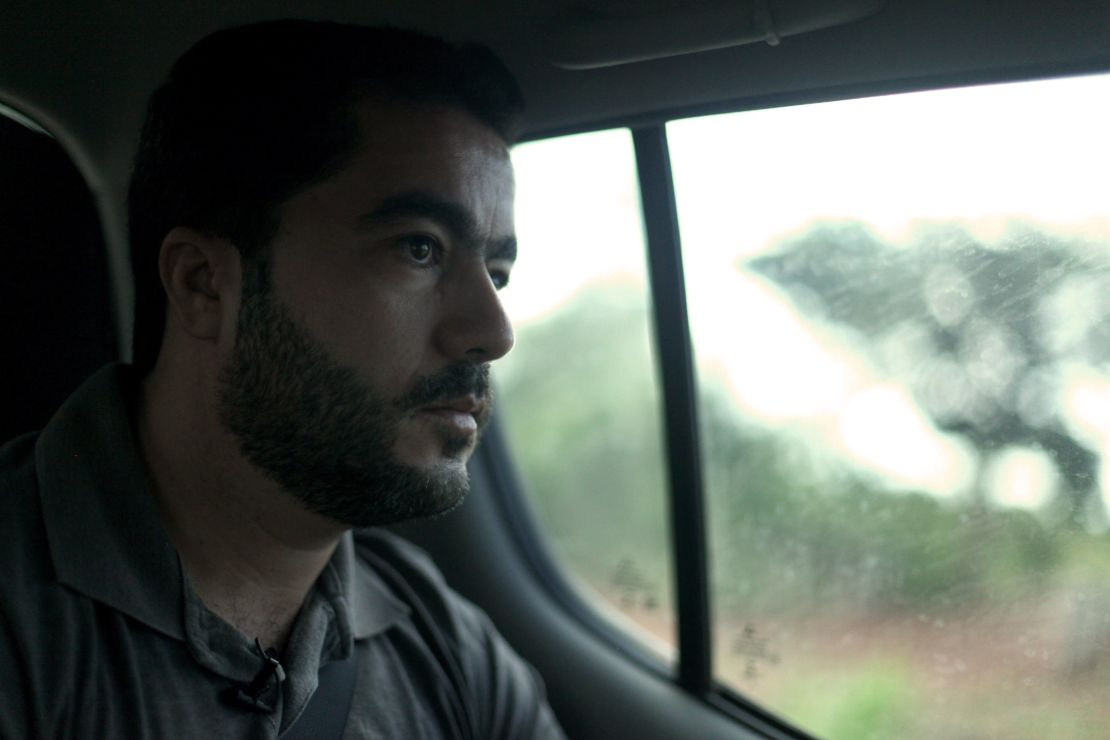Arapoema, Brazil (CNN) – In this small town on the edge of Brazil’s somewhat lawless agricultural frontier, streets turn to mud under tropical rains and laundry hangs limp in front of cement-box houses.
There’s one bank and two churches. But for most folks here, if you want a job, you have to head to one of the nearby cattle ranches - only recently carved out of the steamy Amazon jungle.
Luiz Cardoso da Silva, a 69-year-old ranch hand, has worked on half a dozen. But he hopes to never go back.
“I want to spend more time here at home, maybe line up a little something close to my family. There would be nothing better than that,” says Seu Luiz, as he is known.

On a recent Saturday, Seu Luiz and several of his children crowded into their kitchen for plates of rice, beans and fried liver. The women perched on rustic wooden chairs in the one-room house and the men squatted out back.
“Anybody who’s been in the leopard’s mouth is real happy right here,” Seu Luiz said.
‘Treated like animals’
Just three days earlier, Seu Luiz was sleeping on the floor of a cattle corral, surrounded by fetid mud.
He and six relatives had been living and working on the ranch for two years, building fences and weeding pastures. There was no bathroom, just a single outdoor spigot to shower and wash clothes and dishes. Nearby bushes served as a toilet.
That’s how they were found when an eight-car convoy, lights flashing, pulled into the ranch. One of the Brazilian mobile units tasked with cracking down on worker exploitation across the country was following up on a tip.
Marcelo Goncalves Campos, a veteran inspector for the Labor Ministry, shook his head as he took notes.
“I’ve been an inspector for almost 20 years and this is really one of the worst cases I’ve seen,” he said. “They are being treated, without any exaggeration, like animals. Sleeping in the same corral as the cattle.”
Seu Luiz tells inspectors that they haven’t received any money for the last two years. He says the ranch owner provides them with food, deducts it from their wages and claims that they ended up owing him money.
“You can’t leave because you owe money for the food he’s given you, you have a debt.” He says he was afraid for the safety of his family if he left.
Debt bondage is common in Brazil’s lawless cattle country, according to the coordinator of this latest operation, Andre Wagner, also from the Labor Ministry.
“You’ll see someone working in degrading conditions, with an exhausting work schedule, eating one meal a day, while they don’t receive any form of salary or a very small one, because their food and tools are discounted,” he says.
An uphill fight
In fact, more than 50,000 workers have been rescued from what Brazil defines as slave-like conditions since the mobile units were created in 1995. A third of them came from ranches.
Read: How traffickers steal kidneys
Read: School brings hope to child slaves in India
But it’s an uphill fight with roughly 25,000 Brazilians lured into slavery every year, according to the Catholic Pastoral Land Commission, or CPT. They also end up working in coalmines, sugar cane fields, urban construction sites and garment factories.
Brazil’s resources for fighting exploitation are limited. The number of mobile units - comprised of inspectors, prosecutors and federal police - has fallen to four from eight just a decade ago.
“Our method for fighting slavery is good, but we have very few inspectors,” says Wagner. “When the complaints are received at our headquarters in Brasilia, we can’t go immediately. The delays mean the conditions might have changed.”
The delays are often five or six months, he says.
‘Nobody deserves to live like this’
In the case of Seu Luiz, it’s a recent tip - just two weeks old.
On the day the mobile unit shows up, the ranch owner is nowhere to be found and doesn’t answer his phone. That makes it hard for them to secure an immediate payout for workers.
Read: Thousands risk being trafficked in Latin America
Read: How hero trucker saved sex trafficking victim
Read: Canadian teenagers sold for sex
Read: The slaves catching your seafood
But the inspectors gather evidence that can be used in negotiations or an eventual trial, setting up an impromptu office on a patio at the ranch. They log hours of interviews and investigate the owner’s assets.
Wagner says financial compensation averages about $2,000 for exploited workers but when the conditions are extreme, it can be 10 times that.
The first priority, however, is removing the family from the ranch.
Maria Dalva Sousa, 18, had been living with her husband and toddler son in a shack on the edge of the corral.
“I just want to get out of here, nobody deserves to live like this,” she says. “Look at this mud, only rats can sleep in a place like this.”
Together, they all roll up a couple of foam mattresses, stuff clothes into cardboard boxes and load a stove onto the back of a police pick-up truck. After two years of grinding work on the ranch, these are their few possessions of value.

Cattle country
In northern Brazil, cattle roam the rolling pastures.
Huge swaths of the Amazon rainforest were cut down to create these ranches. At first, farmers were encouraged by the government to settle the land. Then they seized more territory illegally.
The famous grass-fed beef produced on these ranches is a staple at home and an important export for Brazil, accounting for $4.35 billion in revenues in 2016.
Few consumers suspect that extreme labor exploitation is an ingrained part of this culture.
But Xavier Plassat, a French Dominican friar, has dedicated his life to fighting what he calls modern-day slavery in the region.
“The main point about slavery is that someone wants to make a profit with zero cost,” he says. “Here, more than anywhere, it is easy to make a profit with zero cost. You are on the frontier of farming, of ranching.”
Plassat, 66, works with the Pastoral Land Commission, coordinating their national campaign against labor exploitation.
He has a network of agents and informants who talk to ranch-hands and send reports of labor abuses to federal authorities. Initially, their tips lead to about a quarter of the mobile unit raids.
This has gotten some of the church activists killed - most notably Dorothy Stang, the American-born nun who was shot and killed in 2005.
“I don’t say we want to be martyrs,” Plassat says. “But we try to be present to share the suffering and help the workers.”

‘Impunity, greed, vulnerability, misery’
Plassat shows us a safe house run by the Pastoral Commission where workers who have been rescued by the mobile units can eat and sleep while they fight for compensation.
He says conditions have improved in the region, but says modern-day slavery is far from being eradicated.
“Slavery is a system and it has several roots: impunity, greed, vulnerability, misery. If you don’t address all of it at the same time you will probably have the same persons coming back to the same cycle of enslavement,” he says.
He is concerned that Brazil could actually be sliding backwards on the issue.
An increasingly powerful rural lobby in the national congress has pushed to relax the country’s very broad definition of slave labor while the resources to fight it have shrunk.
One of the main tools used to shame employers into compliance has also been undermined - every year the Labor Ministry publishes a “Dirty List” of companies caught exploiting workers. But recently, its publication has been repeatedly blocked or delayed.
Return to slavery?
For Seu Luiz, good news finally comes. The ranch owner’s family has agreed to pay the equivalent of $38,000 in back wages and penalties for pain and suffering - to be divided among the seven workers.
Seu Luiz says he’ll use it to move out of the one-room house he rents and finally buy a home of his own. Something he hopes will protect his children in the future.
In the meantime, a federal prosecutor has filed criminal charges against the ranch owner. Those charges are currently being reviewed by a judge.

For Wagner, the raid was a success. But he says you can never really be sure that you’ve saved someone.
“It’s possible Sue Luiz won’t return to these working conditions,” he says. “But it’s also possible he will. Given his age and his limited professional qualifications, he will continue to be a potential victim of slave labor.”





